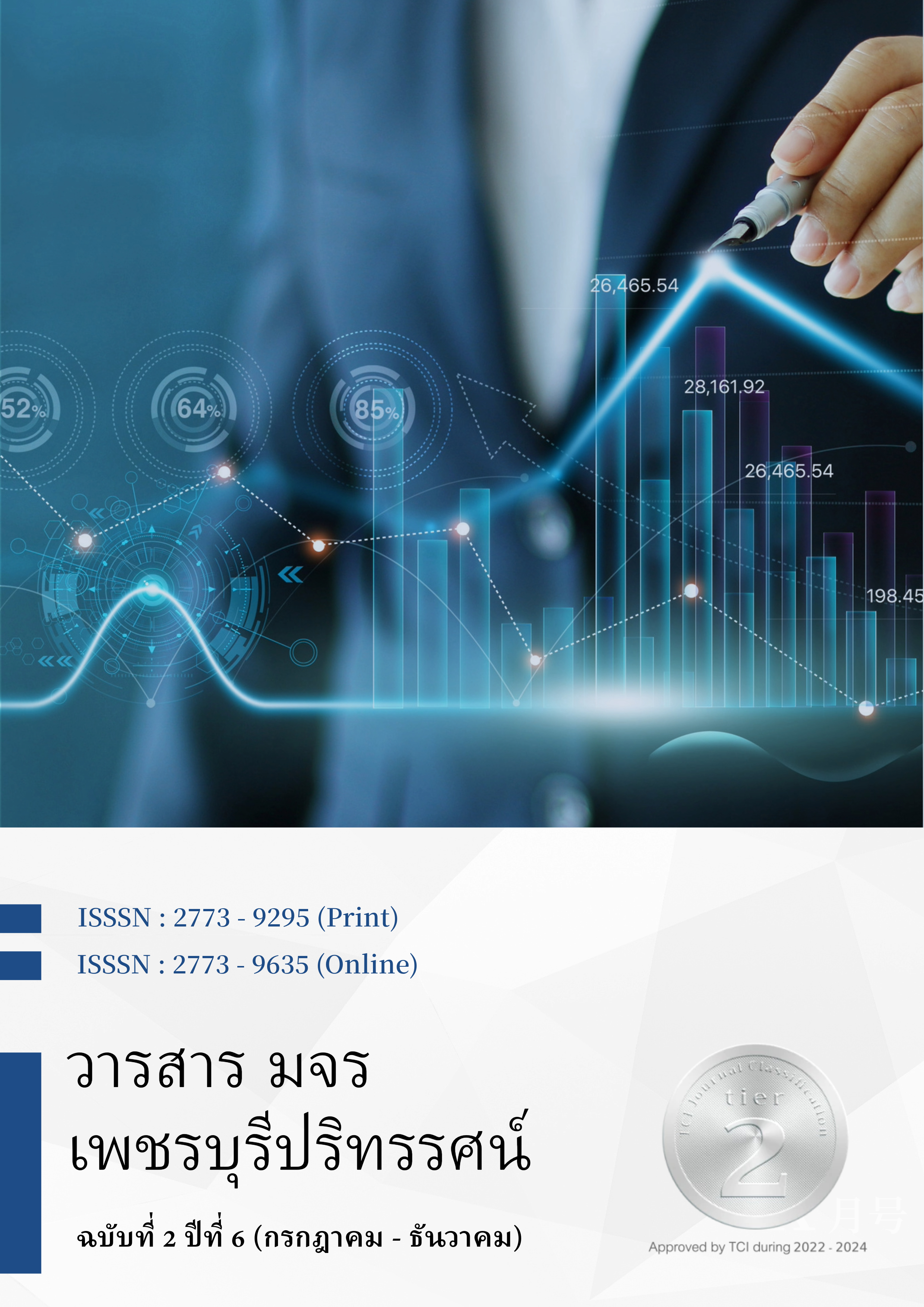THE ACTIVE LAERNING ACTIVITIES IN THE NEXT NORMAL ERA TO ENHANCE THE COMPETENCY OF PHETCHABURI PROFESSIONAL TEACHER FOR STUDENTS TEACHER OF PHETCHABURI RAJABHAT UNIVERSITY
Main Article Content
Abstract
This research aimed to develop active learning activities in the next normal era and to develop Phet innovator teacher skills of Phetchaburi Rajabhat University students by using active learning activities in the next normal era. The sample group were 125 Social Studies major students in the first year to third year who studied in Practicum in Profession of Teaching course. The research instruments were 1) A course syllabus of Practicum in Profession of Teaching taught by active learning, 2) An observation form of Phetchuburi Professional Teacher skills with 5 skills. The data were analyzed by using mean (), standard deviation (S.D.) and content analysis.
The findings appeared that five steps of the active learning activities to develop Phetchuburi Professional Teacher skills of Phetchaburi Rajabhat students in the next normal era consisted of 1) Seek information, 2) See all problems, 3) Seek diversity, 4) Find all-round answers, 5) Find appropriate conclusions. The active learning method was also integrated with other learning activities systems such as Google classroom, other applications and digital tools. After using active learning in the next normal era, the students’ skills were at a high level (=4.28). When considered in each skill, it was found the mean of collaboration skill was the highest (=4.62), the communication skill (=4.38), the creative skill (=4.26) and information technology skills (=4.14) were ranked respectively, while the mean of critical thinking skills were the lowest (=3.66).
Keywords : Active Learning Activities, Next normal Era, Phetchuburi Professional Teacher
Article Details

This work is licensed under a Creative Commons Attribution-NonCommercial-NoDerivatives 4.0 International License.
References
กองทุนเพื่อความเสมอภาคทางการศึกษา. (2563). บทความ“ผศ.อรรถพล” เปิดโมเดล “Remote Learning” ปรับการเรียนการสอนรับ COVID-19. เข้าถึงได้จาก https://www.eef.or.th/93-2/.
ทวีวัฒน์ วัฒนกุลเจริญ. (2551). การเรียนเชิงรุก (Active learning). เข้าถึงได้จาก http://pirun.ku.ac.th/ สืบค้นเมื่อ 15 มกราคม 2566
บัณฑิกา จารุมา และพะยอม ก้อนในเมือง. (2563). วิธีพัฒนาทักษะการสื่อสารที่มีประสิทธิภาพ. วารสาร มจร. มนุษยศาสตร์ปริทรรศน์, 8(1), 433-428.
พรทิพย์ วงศ์ไพบูลย์. (2560). การเรียนรู้เชิงรุกและการมีส่วนร่วมของผู้เรียน (Active learning). วารสารสถาบันวิจัยญาณสังวร มหาวิทยาลัยมหามกุฏราชวิทยาลัย, 8(2), 327-336.
พิมพันธ์ เดชะคุปต์. (2561). ทักษะ 7C ของครู 4.0. (พิมพ์ครั้งที่ 4). กรุงเทพฯ: โรงพิมพ์แห่งจุฬาลงกรณ์มหาวิทยาลัย.
สุคนธ์ สินธพานนท์. (2560). ครูยุคใหม่กับการจัดการเรียนรู้ สู่การศึกษา 4.0. กรุงเทพฯ : ศูนย์หนังสือจุฬาลงกรณ์ มหาวิทยาลัย.
สุรไกร นันทบุรมย์. (2560). ความสัมพันธ์ระหว่างการเรียนรู้แบบผสานวิธีห้องเรียนกลับด้าน พื้นที่การ เรียนรู้ และการเรียนรู้เชิงรุก. วารสารห้องสมุด, 61(2), 45-63.
สุวัลยา โพธิ์พะเนาว์. (2552). การพัฒนาการสื่อสารในสำนักงานเขตการศึกษานครราชสีมา. เขต 2 มหาวิทยาลัยมหาสารคาม.
สำนักงานเลขาธิการสภาการศึกษา กระทรวงศึกษาธิการ. (2561). มาตรฐานการศึกษาของชาติ พ.ศ. 2561. เข้าถึงได้จาก http://www.sesa17.go.th/site/images/Publish2.pdf.
Bill, P. (2010). Three Principles of Effective Online Pedagogy. J Asynchronous Learn Networks, 14(1), 103-116.
Mckinney, S. E. (2008). Developing Teachers for High-Poverty Schools : The Role of the Internship Experience. Urban Education. 43(1), 68-82. Online from http://www.eric.ed.gor.
World Health Organization. (2021). Timeline: WHO's COVID-19 response. Online from https://www.who.int/emergencies/diseases/novel-coronavirus-2019/interactive-timeline#event- 72.


